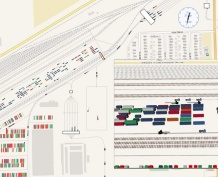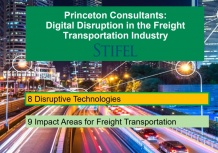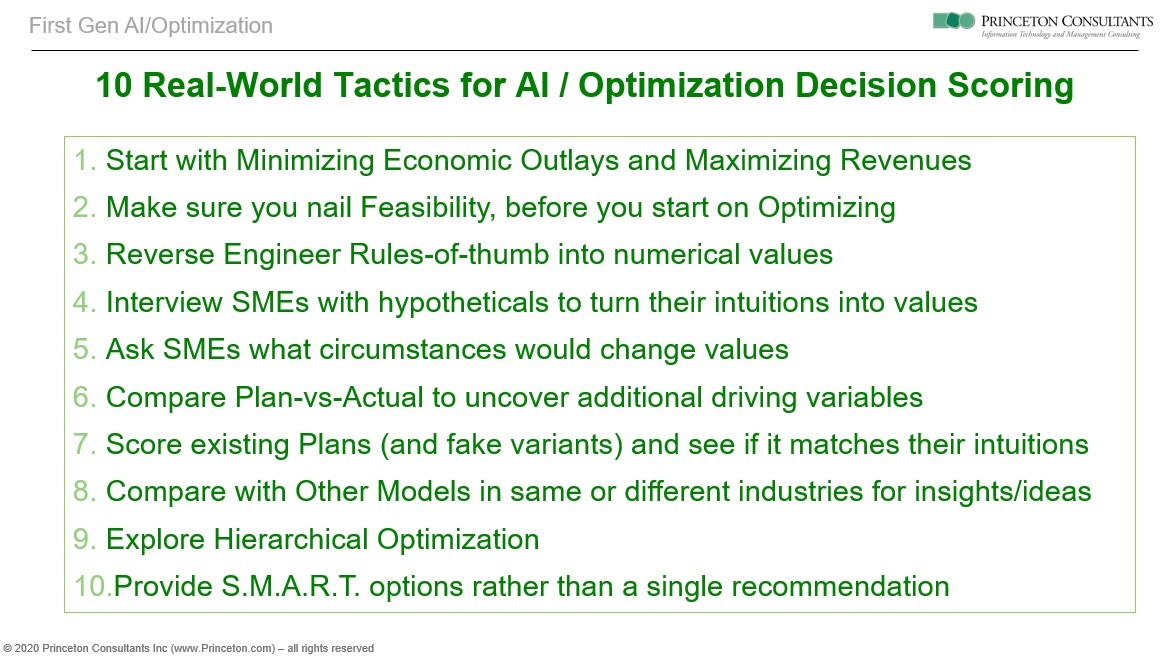We define optimizing simulation as the application of optimization principles to simulation, taking it from predictive analytics to prescriptive analytics. Optimization is layered on top of inputs and a simulation to determine optimal policies, decisions, and even operating parameters based on key KPIs. This allows us to simulate environments, facilities, and different decisions that people need to make, but also to optimize those scenarios.
The Optimization Edge
A Blog for Business Executives and Advanced Analytics Practitioners
Technologies: Data Science, Big Data, Optimization, Machine Learning, Artificial Intelligence, Predictive Analytics, Forecasting
Applications: Operations, Supply Chain, Finance, Health Care, Workforce, Sales and Marketing


In the electric utility industry, an Independent System Operator (ISO) coordinates and directs the flow of electricity over a region’s high-voltage transmission system. Like an air traffic controller, an ISO oversees the daily operation of the power grid.

Steve is a frequent guest on Sirius XM Radio’s Road Dog Trucking, hosted by Mark Willis. Following is a lightly edited excerpt from his April 1 appearance.
Steve Sashihara: Fortuitously, we added electric trucks to our survey this year. The president’s proposed infrastructure plan is very heavy on electric vehicles, and I think trucking will get its share.
Mark Willis: Let’s talk about that. What did the numbers look like from the survey respondents? Was it better or less than 50 percent that EVs will have a moderate impact by maybe four or five years from now?

In a webinar with Stifel Managing Director of Research David Ross, Steve presented the results of our annual survey of transportation executives. Following is a lightly edited excerpt.
This year, we were pleased to get 126 responses, about half from executives at carriers, 3PLs and brokers. For eight disruptors, we asked “By 2025, will it have 1) essentially no real impact on freight transportation? 2) limited impact in small niches? 3) moderate impact, particularly at the high end? Or 4) a large impact and be very common?”

We recently presented our work with Birchbox, the premier beauty subscription service, to a panel of judges for the INFORMS Wagner Prize for excellence in the practice of operations research and innovation in mathematics and advanced analytics. One judge asked how customer preferences and behavior are incorporated into the optimization model for product assortment.

As COVID-19 impacted the United States in the summer of 2020, universities struggled to plan for the return of live sports events at their stadiums and arenas. Ticketing and analytics groups at many major universities manually prepared seating plans for the fall football season based on assumptions of limited capacity in a safe environment, without knowing whether fans would be permitted or to what extent. If attendance were to be permitted, it was unclear how a venue could best host different sizes of pods of fans sitting together (most fans attend events with family, friends or classmates). Many universities opted to wait for a blanket software solution from a ticket service provider. The football season, which generates more than $4 billion in annual revenue for the top 65 universities, approached amid extreme health and regulatory uncertainty, and divergent local strategies.
Following is a lightly edited excerpt from Steve’s presentation for “New Frontiers of Analytics Practice” at the INFORMS Annual Meeting in November. For his introductory discussion of fuzzy objectives, see the previous post.

Following is a lightly edited excerpt from Steve’s presentation for “New Frontiers of Analytics Practice” at the INFORMS Annual Meeting in November.
Princeton Consultants helps organizations move great insights into AI deployment. Our value proposition is that we deliver high speed and quality, and reduced risk. For the latter, we have developed a series of scoreable risk factors called the “Princeton 20.” For a typical first-generation AI optimization project, we work with management and tag different factors that should be addressed to make the project as successful and as low risk as possible.

Margaret Wright is a distinguished researcher in optimization, linear algebra, and scientific computing, currently the Silver Professor of Computer Science at the Courant Institute of Mathematical Sciences, New York University. She is best known for groundbreaking work on barrier methods and nonlinearly constrained optimization, and on optimization without derivatives. In 2019 she was awarded the John von Neumann prize for her contributions to the numerical solution of optimization problems.
I have known Margaret since I was a graduate student in the mid 1980’s at Stanford when she was a research professor in the university’s Systems Optimization Laboratory. In August 2019, I interviewed her for the INFORMS Oral Histories program (video and full transcript are found here).

Gurobi hosted a webinar by Irv and Rob to discuss innovative optimization work with Birchbox, the trailblazing e-commerce business. They were joined by Birchbox VP of Global Business Technology David Bendes, who leads subscription technology and operations, data and business intelligence, and platform product management, focusing on creating data‑driven experiences and the technologies that power them. We summarized the technical aspects of this work in a previous post; following are lightly edited excerpts from the webinar.
